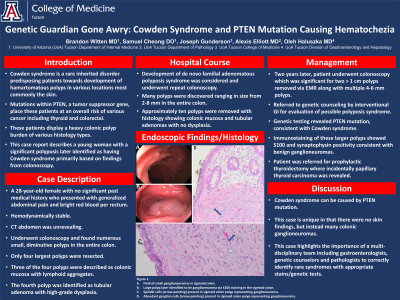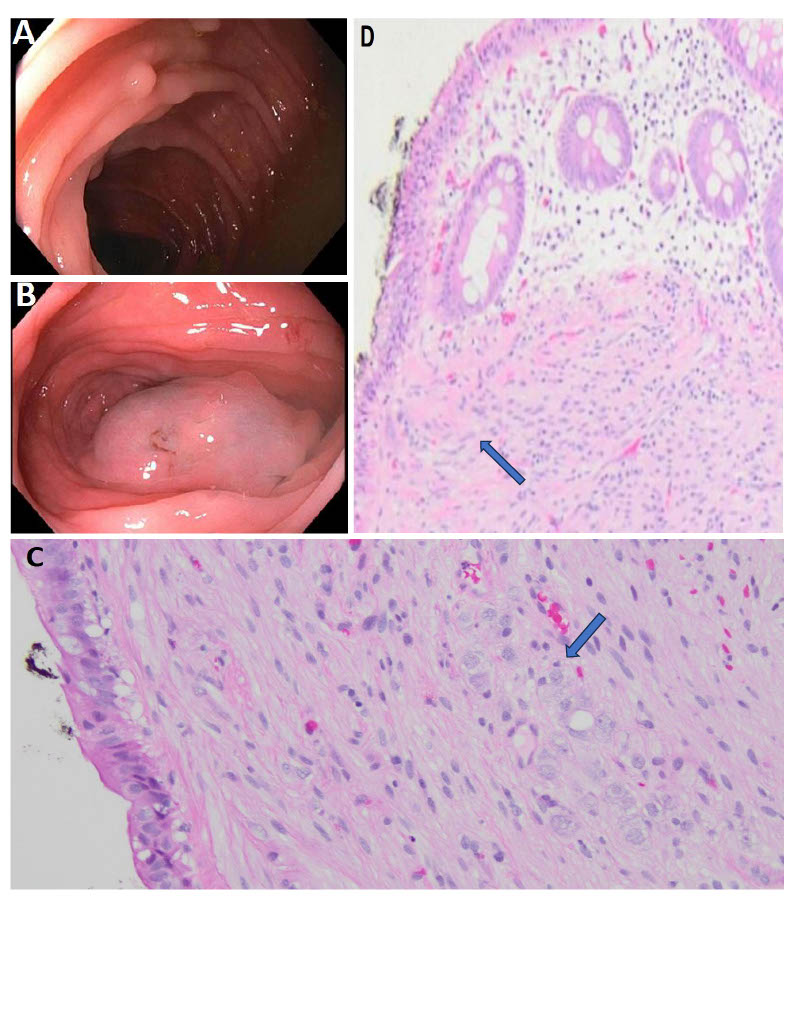Monday Poster Session
Category: Colon
P2023 - Genetic Guardian Gone Awry: Cowden Syndrome and PTEN Mutation Causing Hematochezia
Monday, October 28, 2024
10:30 AM - 4:00 PM ET
Location: Exhibit Hall E

Has Audio

Samuel H. Cheong, DO
Banner - University of Arizona
Tucson, AZ
Presenting Author(s)
Brandon Witten, MD1, Samuel H. Cheong, DO2, Joseph Gunderson, 1, Alexis Elliott, MD1, Oleh Haluszka, MD1
1University of Arizona College of Medicine, Tucson, AZ; 2Banner - University of Arizona, Tucson, AZ
Introduction: Cowden syndrome is a rare inherited disorder predisposing patients towards the development of hamartomatous polyps in various locations most commonly the skin. Mutations within PTEN, a tumor suppressor gene, place these patients at an overall risk of various cancer including thyroid and colorectal. It has been described that these patients display a heavy colonic polyp burden of various histology types. We report on a significant polyposis in a young woman later identified as having Cowden syndrome primarily based on findings from colonoscopy.
Case Description/Methods: Patient was a 28 year old female with no significant past medical history who presented to the emergency department for generalized abdominal pain and bright red blood per rectum. Hemodynamically stable, CT abdomen was unrevealing as to the etiology of this abdominal pain and bleeding. Underwent colonoscopy where numerous small small/diminutive polyps in the entire colon. Only the four largest polyps were resected. Three of the four polyps were described as colonic mucosa with lymphoid aggregates, the fourth was identified as tubular adenoma with high grade dysplasia.
Development of de novo familial adenomatous polyposis syndrome (FAP) was considered and they underwent repeat colonoscopy. Many polyps were discovered ranging in size from 2-8mm in the entire colon. Approximately ten polyps were removed histology showing colonic mucosa and tubular adenomas with no dysplasia. Two years later underwent colonoscopy which was significant for two >1cm polyps removed via EMR along with multiple other 4-6mm polyps. Referred to genetic counseling by interventional GI for evaluation of possible polyposis syndrome. Genetic testing revealed PTEN mutation, consistent with Cowden syndrome. Immunostaining of these larger polyps showed S100 and synaptophysin positivity consistent with benign ganglioneuromas. After confirmation of PTEN mutation she was referred for prophylactic thyroidectomy where incidentally papillary thyroid carcinoma was revealed.
Discussion: Cowden syndrome can be caused by PTEN mutation. Our case is unique in that there were no skin findings and instead the many colonic ganglioneuromas. This case highlights the importance of a multi-disciplinary team including gastroenterologists, genetic counselors and pathologists to correctly identify rare syndromes with appropriate stains/genetic tests. Especially since thyroid carcinoma was incidentally discovered as a result of numerous polyps on colonoscopy prompting genetic screening.

Disclosures:
Brandon Witten, MD1, Samuel H. Cheong, DO2, Joseph Gunderson, 1, Alexis Elliott, MD1, Oleh Haluszka, MD1. P2023 - Genetic Guardian Gone Awry: Cowden Syndrome and PTEN Mutation Causing Hematochezia, ACG 2024 Annual Scientific Meeting Abstracts. Philadelphia, PA: American College of Gastroenterology.
1University of Arizona College of Medicine, Tucson, AZ; 2Banner - University of Arizona, Tucson, AZ
Introduction: Cowden syndrome is a rare inherited disorder predisposing patients towards the development of hamartomatous polyps in various locations most commonly the skin. Mutations within PTEN, a tumor suppressor gene, place these patients at an overall risk of various cancer including thyroid and colorectal. It has been described that these patients display a heavy colonic polyp burden of various histology types. We report on a significant polyposis in a young woman later identified as having Cowden syndrome primarily based on findings from colonoscopy.
Case Description/Methods: Patient was a 28 year old female with no significant past medical history who presented to the emergency department for generalized abdominal pain and bright red blood per rectum. Hemodynamically stable, CT abdomen was unrevealing as to the etiology of this abdominal pain and bleeding. Underwent colonoscopy where numerous small small/diminutive polyps in the entire colon. Only the four largest polyps were resected. Three of the four polyps were described as colonic mucosa with lymphoid aggregates, the fourth was identified as tubular adenoma with high grade dysplasia.
Development of de novo familial adenomatous polyposis syndrome (FAP) was considered and they underwent repeat colonoscopy. Many polyps were discovered ranging in size from 2-8mm in the entire colon. Approximately ten polyps were removed histology showing colonic mucosa and tubular adenomas with no dysplasia. Two years later underwent colonoscopy which was significant for two >1cm polyps removed via EMR along with multiple other 4-6mm polyps. Referred to genetic counseling by interventional GI for evaluation of possible polyposis syndrome. Genetic testing revealed PTEN mutation, consistent with Cowden syndrome. Immunostaining of these larger polyps showed S100 and synaptophysin positivity consistent with benign ganglioneuromas. After confirmation of PTEN mutation she was referred for prophylactic thyroidectomy where incidentally papillary thyroid carcinoma was revealed.
Discussion: Cowden syndrome can be caused by PTEN mutation. Our case is unique in that there were no skin findings and instead the many colonic ganglioneuromas. This case highlights the importance of a multi-disciplinary team including gastroenterologists, genetic counselors and pathologists to correctly identify rare syndromes with appropriate stains/genetic tests. Especially since thyroid carcinoma was incidentally discovered as a result of numerous polyps on colonoscopy prompting genetic screening.

Figure: A: Field of small ganglioneuromas in sigmoid colon.
B: Large polyp later identified to be ganglioneuroma via S100 staining in the sigmoid colon.
C: Spindle cells (arrow pointing) present in sigmoid colon polyp representing ganglioneuroma.
D: Abundant ganglion cells (arrow pointing) present in sigmoid colon polyp representing ganglioneuroma.
B: Large polyp later identified to be ganglioneuroma via S100 staining in the sigmoid colon.
C: Spindle cells (arrow pointing) present in sigmoid colon polyp representing ganglioneuroma.
D: Abundant ganglion cells (arrow pointing) present in sigmoid colon polyp representing ganglioneuroma.
Disclosures:
Brandon Witten indicated no relevant financial relationships.
Samuel Cheong indicated no relevant financial relationships.
Joseph Gunderson indicated no relevant financial relationships.
Alexis Elliott indicated no relevant financial relationships.
Oleh Haluszka indicated no relevant financial relationships.
Brandon Witten, MD1, Samuel H. Cheong, DO2, Joseph Gunderson, 1, Alexis Elliott, MD1, Oleh Haluszka, MD1. P2023 - Genetic Guardian Gone Awry: Cowden Syndrome and PTEN Mutation Causing Hematochezia, ACG 2024 Annual Scientific Meeting Abstracts. Philadelphia, PA: American College of Gastroenterology.
